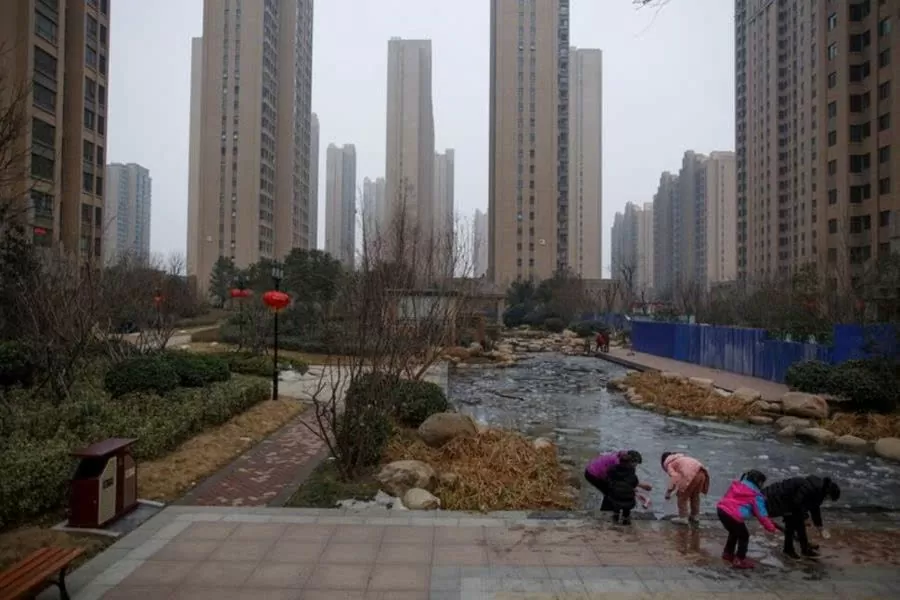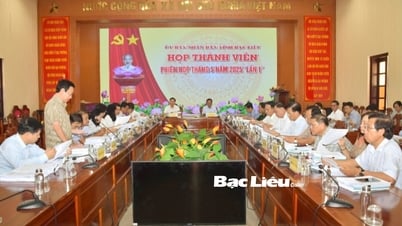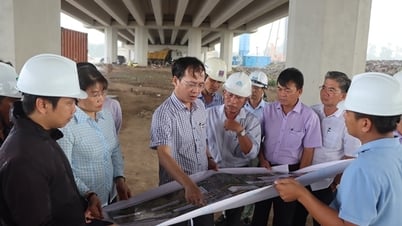China will expand its “white list” of real estate projects and accelerate bank lending for unfinished projects to 4 trillion yuan ($561.8 billion) by the end of this year, the Ministry of Housing and Urban-Rural Development said.
China's Minister of Housing and Urban-Rural Development Ni Hong made the announcement at a recent press conference of the ministry, along with officials from the People's Bank of China, the Ministry of Finance and the National Financial Regulatory Authority.
A total of 2.23 trillion yuan has been approved for “whitelisted” project developers, according to a senior official from the National Financial Supervisory Authority. That figure will nearly double to 4 trillion yuan by the end of 2024.
 |
| Inside the grounds of an apartment complex in Zhengzhou, Henan Province, China. Photo: Reuters |
Launched in January this year, China’s “white list” initiative allows city governments to recommend housing projects to banks to speed up the lending process. The aim is to ensure housing projects are completed and handed over to buyers.
All commercial housing projects are now eligible for the “white list,” Xiao Yuankai, vice minister of the Financial Regulatory Authority, said on Oct. 17. The move is expected to expand the list. Xiao also stressed that banks should deploy capital “as soon as possible,” and that they can disburse the entire amount to developers instead of dividing it into several tranches.
The press conference was one of the latest high-level policy announcements by the Chinese government aimed at bolstering the economy .
In late September, Pan Gongsheng, governor of the People’s Bank of China, announced a 50 basis point cut in the amount of cash that banks must hold, known as the reserve requirement ratio (RRR). He also reduced the minimum down payment for second-home loans nationwide from 25% to 15%.
Days later, at a high-level meeting chaired by Chinese President Xi Jinping, officials pledged to “stop the property market’s decline and promote a steady recovery.”
Some investors have viewed the recent activity as a sign that Beijing is finally ready to take drastic measures to stimulate growth, and they had hoped for more stimulus from the press conference. While Mr. Xiao was speaking, China’s CSI 300 real estate index fell more than 5%, reversing sharply from a gain of about 8.7% in the previous three trading sessions.
Over the weekend, Chinese finance ministry officials announced that they would allow local governments to issue more special bonds to buy land and allow affordable housing subsidies to be used for existing housing inventory, rather than just for new construction.
Chinese property stocks surged on October 14 following the news, with the onshore Hang Seng property index up more than 2%. The property sector was also the top performer in China’s CSI 300 index, up nearly 5%.
The HSMPI has lost more than 80% of its value since its peak in 2020. In May, Mr. Nge Hong told reporters at a press conference that developers who “need to go bankrupt should go bankrupt or be restructured.”
More than 50 cities across China have rolled out policies to boost the property market, according to state media.
Ahead of the Golden Week holiday, the city of Guangzhou announced it would lift all restrictions on home purchases. Meanwhile, the governments of Beijing, Shanghai and Shenzhen have moved to ease restrictions on home purchases by non-local buyers and reduce minimum down payments.
The measures come after previous ones in China failed to produce a significant recovery. New home prices fell at their fastest pace in more than nine years in August, according to data from the National Bureau of Statistics.
The value of new homes sold in the first eight months of this year fell 23.6% from a year earlier, a slight improvement from the 24.3% decline in the first seven months. The median home price fell 6.8% in August from the previous month on a seasonally adjusted basis, according to Goldman Sachs.
The real estate sector, which once accounted for more than a quarter of China’s economy, has been in a deep recession since 2021, as Beijing’s crackdown on the sector’s high debt levels has caused many developers to default and left many housing projects unfinished, severely undermining homebuyer confidence in the market.


![[Photo] Prime Minister Pham Minh Chinh chairs meeting on science and technology development](https://vphoto.vietnam.vn/thumb/1200x675/vietnam/resource/IMAGE/2025/5/17/ae80dd74c384439789b12013c738a045)

![[Photo] Readers line up to visit the photo exhibition and receive a special publication commemorating the 135th birthday of President Ho Chi Minh at Nhan Dan Newspaper](https://vphoto.vietnam.vn/thumb/1200x675/vietnam/resource/IMAGE/2025/5/17/85b3197fc6bd43e6a9ee4db15101005b)


![[Photo] More than 17,000 candidates participate in the 2025 SPT Competency Assessment Test of Hanoi National University of Education](https://vphoto.vietnam.vn/thumb/1200x675/vietnam/resource/IMAGE/2025/5/17/e538d9a1636c407cbb211b314e6303fd)




![[Photo] Explore the Great Wall of Water in the Suburbs of Beijing, China](https://vphoto.vietnam.vn/thumb/402x226/vietnam/resource/IMAGE/2025/5/5/c2e706533d824a329167c84669e581a0)





















![[Photo] Nearly 3,000 students moved by stories about soldiers](https://vphoto.vietnam.vn/thumb/1200x675/vietnam/resource/IMAGE/2025/5/17/21da57c8241e42438b423eaa37215e0e)






































































Comment (0)